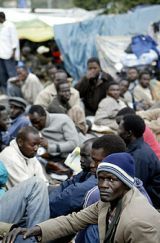Egypt- resumption of Sudanese refugee repatriation
By Roba Gibia
Nov 20, 2006 (CAIRO) — After deferral of voluntary Sudanese refugee repatriation in Egypt for more than three weeks, the repatriation process has resumed both by land and air in special cases to Khartoum.
 The Representative of GOSS for Humanitarian Affairs Ahmed Omar Abdelrahman, who spent Ramadan holidays with his family in Sudan, was in Cairo for few days to supervise the repatriation process.
The Representative of GOSS for Humanitarian Affairs Ahmed Omar Abdelrahman, who spent Ramadan holidays with his family in Sudan, was in Cairo for few days to supervise the repatriation process.
The suspension of voluntary repatriation process for more than three weeks which was claimed due to Eid Fitr holidays has cast lot of uncertainty among Sudanese refugees who are willing to return under this program, as well as the credibility and sustainability of program.
Thus, at this juncture, we have to cross our hands and play it by ears to see as whether there will be another disruption in the repatriation process!
Since last September, Southern Sudan government has launched an initiative for voluntary repatriation of south Sudanese refugees in Egypt.
According to Ajing Deng, one of the SSoG official in charge of the operation, that after the resumption of the repatriation process, they have repatriated 184 refugees in five batches, 36 refugees on November 5, 2006, 34 on November 12, 2006, 37 on November 17, 2006, 41 on November 19, 2006 and 36 as special cases by air.
It is worth noting that the trip now has been scheduled twice a week instead of Sundays only to comply with the newly arranged boat schedules, twice per week. And there are more than 500 refugees under processing and scheduling for repatriation.
“I couldn’t agree with those who were saying that Sudanese refugees in Egypt are unwilling to return home, and that the voluntary repatriation program has to be halted!”, an observer said. “I think this is completely absurd due to the fact that since the commencement of the program in last September, which lasted only for four weeks, 517 refugees were repatriated”, he added .
When the program resumed this month, 184 were repatriated and there are more than 500 refugees enlisted for repatriation and more still registering.
This is a clear indication that there is enthusiasm from Sudanese refugees in Egypt to return home, but there should be consistency and sustainability of the program without interruption of being on and off! As this on and off at the program phase is signaling wrong signal and casting uncertainty in the durability of the program.
To avert any kind of suspicion, there should be general survey of refugees’ opinion or the authorities have to grant ample time to the program, to repatriate voluntarily those who are willing instead of halting program at initial stage and without having actual perception of refugee views.
The most touching event here were the determination of youth gangs to go home, and even some are complaining resentfully about the slowness in processing and scheduling their departure.
These groups whom term themselves as “lost boys” and other as “found boys” have their own reasons and came to exist as a result of nasty events. Some of these boys joint SPLA as child soldiers and have witnessed vicious events in their childhood. As according to one of them, he joint SPLA when he was 12 years to get revenge of his father who was killed by Sudan Armed Forces.
Their deeds were a clear reflection of inner sentiment and frustration that they lost everything and have no future. When the program of voluntary repatriation began, for them is a window of opportunity and glimpse of salvation to new life. They are saying that they wanted go home and leave behind them their style of life, and return to South Sudan as reborn guys, start a new life and participate in the construction of their country.
The commence of Ethiopian Airline its flights on November 17, 2006 from Cairo to Juba via Addis Ababa is a good opportunity for sick and elderly or special cases to be flown directly to Juba instead of Khartoum. As a matter of fact, most of the refugees prefer to be repatriated directly to south instead of being dumped in Khartoum.
The authorities have to take into consideration that refugees in Egypt were not camped and everyone is fighting its own way of living with some assistance from UNHCR, Churches and NGOs.
“Thus, we could not expect their repatriation in great numbers like the other refugees in the neighboring countries, and to be completed within short period”.
These refugees have their own particular anxieties here as well as uncertainty back home. But one thing is certain that everyone loves to go home, but some still conservative and has got reservations about the fate of peace, and the overall stability in south as well as fear of war resumption due to the unfolding events in Sudan.
(ST)
